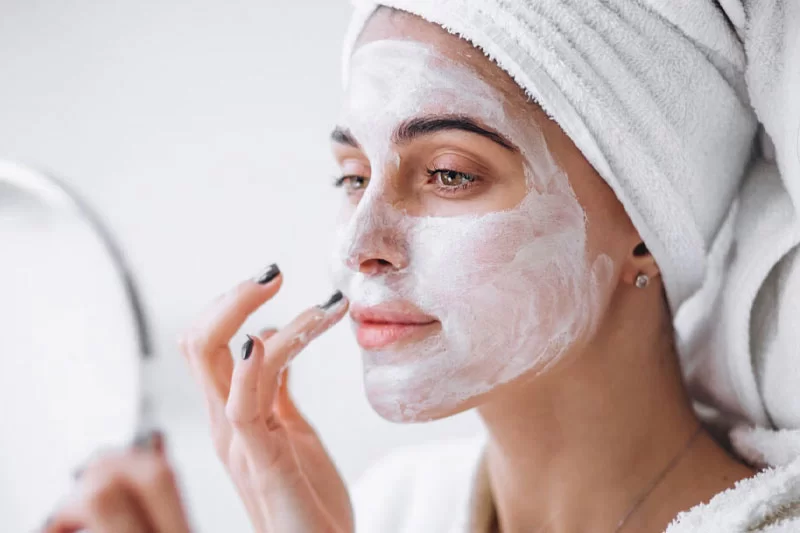introduction
Skin care is the practice of maintaining and enhancing the health and appearance of the skin. It involves a range of practices and products designed to cleanse, protect, and nourish the skin. Key aspects of skin care Skin care refers to the practices and routines aimed at maintaining and improving the skin’s health and appearance. This includes using products and techniques to cleanse, hydrate, and protect the skin, as well as addressing specific skin issues or conditions. Skin care encompasses both daily habits, like washing and moisturizing, and specialized treatments, such as applying serums or undergoing professional procedures. The goal is to enhance skin function, prevent damage, and achieve a healthy, balanced complexion.

Overview of skin types
Certainly! Here’s an overview of skin types without numbers:
Normal:
- Characteristics: Balanced moisture levels, even tone, and no excessive oiliness or dryness. Pores are typically not enlarged, and the skin feels comfortable and smooth.
- Care Tips: Maintain balance with gentle cleansing and regular moisturizing.
Oily:
- Characteristics: Excessive oil production, shiny appearance, enlarged pores, and a tendency to develop acne or blackheads. Often feels greasy or slick.
- Care Tips: Use oil-free or mattifying products, gentle exfoliants, and cleansers that help control oil without stripping the skin.
Dry:
- Characteristics: Lack of moisture, flaky or rough texture, and possible tightness or redness. May have fine lines and less elasticity.
- Care Tips: Apply rich moisturizers, hydrating serums, and gentle cleansers. Avoid hot water and harsh products that can exacerbate dryness.
Combination:
- Characteristics: A mix of oily and dry areas on the face. Commonly, the T-zone (forehead, nose, chin) is oily, while the cheeks and other areas are dry or normal.
- Care Tips: Use products tailored to different areas of the face, like oil-free products for the T-zone and richer moisturizers for dry areas.
Sensitive:
- Characteristics: Prone to redness, irritation, burning, or itching. Often reacts strongly to products, environmental factors, or stress.
- Care Tips: Choose fragrance-free, hypoallergenic products, and avoid harsh ingredients. Stick to a simple routine and patch-test new products.
Acne-Prone:
- Characteristics: Frequent breakouts, clogged pores, and inflammation. Can be oily or combination skin but is specifically affected by acne.
- Care Tips: Use non-comedogenic products, gentle exfoliants, and treatments with ingredients like salicylic acid or benzoyl peroxide.

Importance of skin care
The concept of skin care revolves around maintaining and enhancing the health and appearance of the skin through regular practices and appropriate products. This includes:
- Protection: Guarding the skin from environmental damage like UV rays and pollution.
- Hydration: Keeping the skin moisturized to support its natural barrier and function.
- Cleansing: Removing impurities and excess oil to prevent skin issues.
- Repair: Using treatments and products to address and improve skin concerns, such as aging or acne.
- Balancing: Ensuring the skin’s natural balance is maintained, addressing issues like excess oil or dryness.
- Preventing: Taking steps to avoid skin damage and conditions through proactive measures like sun protection.
- Nurturing: Using products that support the skin’s well-being, including nourishment and repair.
- Adapting: Tailoring routines to the skin’s evolving needs based on factors like age, environment, and lifestyle.

Essential Skin Care Steps
- Cleansing: Remove dirt, oil, and impurities from the skin to keep pores clear and prevent breakouts. Use a gentle cleanser suited to your skin type.
- Toning: Apply a toner to help balance the skin’s pH, refine pores, and remove any residual impurities. Choose a toner that matches your skin needs, such as hydrating or clarifying.
- Exfoliating: Gently remove dead skin cells to promote cell turnover and reveal a smoother, brighter complexion. Exfoliate 1-2 times a week to avoid over-exfoliation.
- Moisturizing: Hydrate the skin to maintain its natural moisture barrier and prevent dryness. Use a moisturizer appropriate for your skin type, whether it’s a lightweight gel or a rich cream.
- Sun Protection: Apply sunscreen daily, even on cloudy days, to protect the skin from harmful UV rays and prevent premature aging and skin damage. Choose a broad-spectrum SPF of at least 30.
- Treatment: Use targeted treatments, such as serums or spot treatments, to address specific skin concerns like acne, hyperpigmentation, or fine lines. Apply these after cleansing and before moisturizing.
- Hydration: Drink plenty of water throughout the day to keep your skin hydrated from within.

Targeted Treatments
Targeted treatments address specific skin concerns and are typically used after cleansing and before moisturizing. Here are some common types:
- Acne Treatments: Products containing ingredients like benzoyl peroxide, salicylic acid, or retinoids help to reduce breakouts, unclog pores, and prevent future acne.
- Anti-Aging Treatments: Serums and creams with ingredients like retinol, peptides, and antioxidants (such as vitamin C) target fine lines, wrinkles, and loss of elasticity, promoting a more youthful appearance.
- Hyperpigmentation Treatments: Ingredients like vitamin C, niacinamide, kojic acid, and hydroquinone help to lighten dark spots, even out skin tone, and reduce the appearance of pigmentation.
- Hydrating Treatments: Serums and essences with hyaluronic acid, glycerin, and aloe vera provide intense hydration, helping to plump and smooth the skin.
- Exfoliating Treatments: Chemical exfoliants such as alpha hydroxy acids (AHAs) and beta hydroxy acids (BHAs) promote cell turnover, improve skin texture, and brighten the complexion.
- Soothing Treatments: Products with ingredients like chamomile, green tea, and allantoin can help calm irritation, reduce redness, and soothe sensitive skin.
- Brightening Treatments: Vitamin C, niacinamide, and licorice root extract help to brighten the skin, enhance radiance, and improve overall skin tone.
- Pore-Minimizing Treatments: Ingredients like niacinamide and clay can help to reduce the appearance of large pores and control excess oil production.
conclusion skin care
In conclusion, skin care is a vital aspect of maintaining and enhancing the health and appearance of your skin. By understanding your skin type and addressing key lifestyle factors, you can create a personalized skin care routine that includes essential steps such as cleansing, toning, moisturizing, and sun protection. Incorporating targeted treatments for specific concerns like acne, aging, hyperpigmentation, and hydration can further optimize your skin’s condition. Consistent and thoughtful skin care practices not only contribute to a healthy, radiant complexion but also promote overall well-being and confidence.

